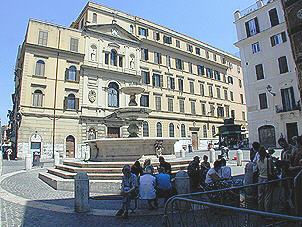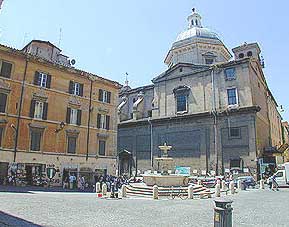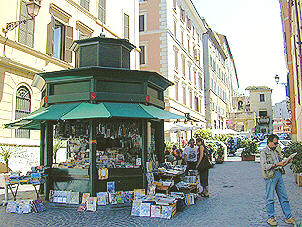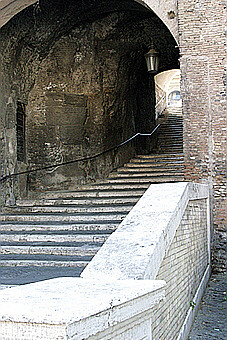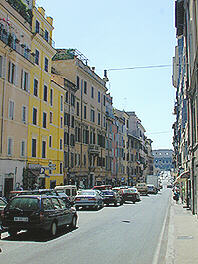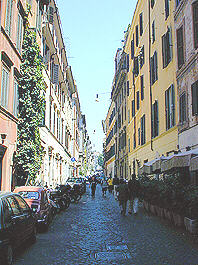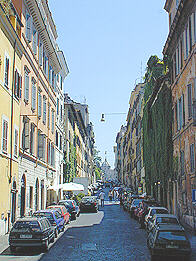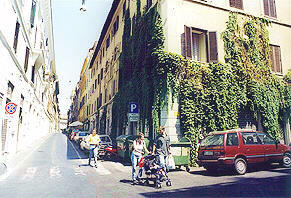MONTI QUARTER - Churches, monuments, streets... and life
The central quarter has great character. Its people
are very friendly, yet with personality.
There are many art shops, craftsmen, charming restaurants and cafes.
There are many gracious zones secluded from car traffic. Art and
history seem to be everywhere, yet there is a very enjoyable atmosphere,
also with a sort of "bohemian" look.
The hospitality of the quarter is renowned since many centuries.
St. Peter lived here, and two churches were built on the sites where he lodged. The famous sculptor Bernini (colonnade of St. Peter, two fountains
of Piazza Navona, the Triton fountain etc.) also lived in the quarter, together
with his father, a sculptor himself. Michelangelo worked in the quarter (for the Moses in
the church of St. Peter in Chain). Much later, some young Italian
physicists, Enrico Fermi and his colleagues also known as the "Ragazzi
(boys) di Via Panisperna", discovered in an old institute nuclear energy, which lead to the
atomic bomb. Perhaps only in Rome such unusual historical combinations
can happen. In this quarter nowadays it is still possible to find
the characteristic, romantic Roman combination of history, art,
love for life. Last and not least you still find the original friendly
inhabitants, who give to the quarter its authentic character. In
many other central quarters this ended after WW2, or at the latest
in the 70s.
The centre of the quarter is Piazza Santa Maria dei Monti:
|
Piazza S. Maria
dei Monti. The Ukraine seminar, and people sitting around
the cultural centre.
|
|
|
Opposite view: the
church of S. Maria dei Monti |
|
The Piazza is very charming. One finds here the central church
of the quarter ("Santa Maria ai Monti"), the Catholic
Ukraine seminar of Rome. In the middle of the square there is a fine fountain, and opposite to the seminar you find the the cultural and recreational centre of
the quarter. There are also some interesting shops,
a restaurant, a "gelateria" - ice cream cafe-, a pastry
shop...and lots of people enjoying themselves.
You can find more photos in the page
presenting the churches.
In the quarter there are many charming streets and corners where car circulation is banned. In the bottom left photo below you can see the Via degli Zingari,
with its characteristic news-stand, its open-air bars, and 17th
century palazzi.
The right photo shows the "Salita dei Borgia" (Borgia's
climb), bringing to the compound of convents among which the church of
St. Peter in chain can be found. In the palazzo at the end of the climb, presently
a convent, you the ivy-clad balcony of Lucrezia
Borgia.
|
Newsstand in Via
degli Zingari |
Right: Stairs of the Borgia (Salita dei Borgia) |
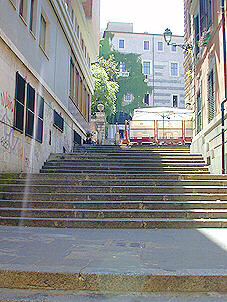 |
|
Left: Higher part of the Stairs of the Borgia, leading to St. Peter in Chain and to the Moses of Michelangelo
The little enjoyable streets of the quarter each have a distinct
personality. They are used by its inhabitants for variety of purposes, and they also include different facilities.
In particular there are old fashioned and family-run "Alimentari"
(grocery stores), the ones with all the kinds of pastas, all the
very special cheese, the sauces etc. These shops are unfortunately
disappearing in Italy, while in the Monti quarter they are still
a reference.
Via dei Serpenti (Sirpent
St.) has three pastry shops, a great ice cream cafe ("Il
Gelatone", please visit the page of the restaurants and
cafes), charactful bars, the best Indian restaurant in town
("Maharaja"), a herbal shop, a chemist shop, and boutiques (and many other shops).
Via Urbana is a quiet, ivy-clad residential
street. |
Via Panisperna is a historical, charactful and charming
street built by Pope Julius II to connect the Basilica of St. Mary Major (probably Rome's most beautiful church, and the favourite of Pope Paul John II) to the Roman Forum and to the Capitol Hill. It has cosy restaurants. In this street, in an
institute which is now an institutional palace, Enrico
Fermi and his "boys" discovered nuclear energy and the
chain reaction.
Via del Boschetto has countless craftsmen
shops with artisans working around the clock, and also art
shops, antiquaries. It is also a favourite place to stroll. |
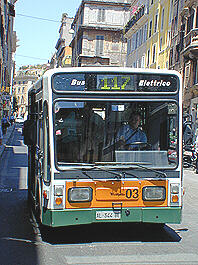 |
Monti: the little
electric bus 117
|
|
| |
|
The little yet frequent and silent bus 117 circulates around
the quarter, and then goes to the Trevi fountain and to the
Spanish Steps.
|
Back to the "Monti quarter general
presentation"
|

